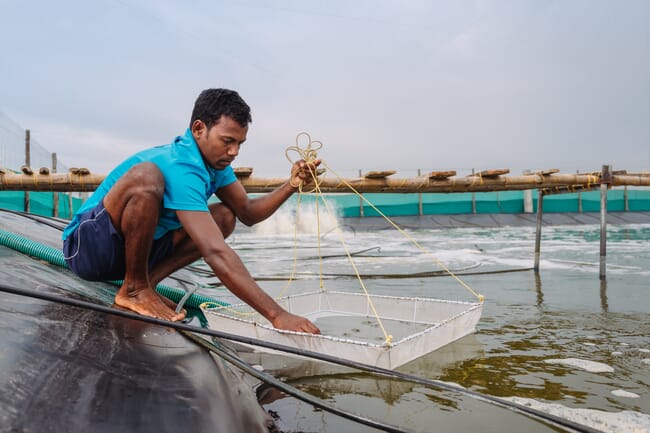
© Aquaconnect
Dubbed the Responsible Farming Practices, the two-year initiative is meant to bring more economic stability to farming communities challenged by a lack of infrastructure, capital, insurance, financial planning, market exposure and access to information on responsible aquaculture practices.
Approximately 90 percent of the world’s aquaculture farms are small-scale or family owned. Initially, the initiative will focus on India and will be modelled in a way that can be applied beyond India.
The initiative consists of four phases. The first phase is assessment and includes identifying infrastructure needs, analysing and prioritising challenges and identifying trainers and farmer participants. The second phase is the implementation of an education and training program using GSA’s Best Aquaculture Practices certification standards as a framework. The third phase is outreach and includes growing the training program through increased participation and building marketplace support for the initiative. The fourth and final stage is graduating the farmer participants from the initiative.
The education and training program will include content on water-quality monitoring, biosecurity, disease management, feed management and data management, delivered through using a train-the-trainers approach with classroom-style workshops and visits to farms participating in the program.
The program will be certificate-based so farmer participants can be recognised for their work, as the key to long-term success is support from the markets purchasing the farmers’ products, which will lead to more consistency and economic stability year-to-year. Ultimately, it is the hope of this partnership that using a certificate-based approach will lead to more standardised practices enticing insurers and creditors to provide practical rates for the aquaculture farming sector in India and beyond.
“As an industry, we need to do a better job of helping farmers improve their lifestyles, educating them and providing them some type of protection through insurance,” said Jose Thomas, president of Choice Canning Company, in a press release. “The objective here is the farmer. Without him or her, there is no shrimp on the shelf. It’s time that we help them more.”
“Farmers and fishers are the people who bring seafood to our tables, so I am thrilled to start this partnership with Choice Canning and TCRS in order to provide support and training to the farmers who want to use responsible practices,” added Wally Stevens, CEO of GSA. “Ultimately, it is this type of work that brings assurances to the marketplace and consumers who want to enjoy seafood.”
“TCRS is committed to bringing improvements to the global farming and fisher communities, the vast majority of which are very small businesses,” concluded George Chamberlain, president of TCRS. “By using the knowledge and experience of experts we will be able to deliver training that will help drive improvements in shrimp farming practices, which will help these small businesses maintain their viability.”



